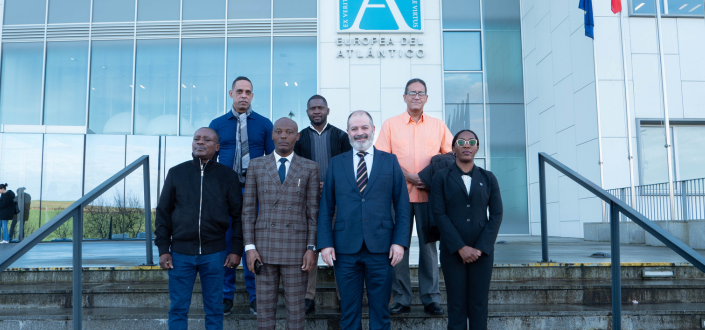The partners of the European Erasmus+ project dedicated to the improvement of nursing education through the inclusion of clinical simulation “Clinical simulation practice-based learning in nursing” (CLINICALSIM), met from February 10 to 14 at the University of Valladolid (UVa) to carry out different training activities.
The conference was attended by all the project partners: the leader, the European University of the Atlantic (UNEATLANTICO); the Polytechnic Institute of Portalegre (IPP) of Portugal; the Universidade Internacional do Cuanza (UNIC), the Universidade José Eduardo dos Santos (UJES), and the Ordem dos Enfermeiros de Angola (ORDENFA).
During the week, the partners recorded several clinical cases at the Advanced Clinical Simulation Center of the Faculty of Medicine of the University of Valladolid (UVa), a partner institution of the project. Similarly, in the coming weeks, the Polytechnic Institute of Portalegre (IPP) in Portugal will be recording clinical simulation cases for training at its own facilities.
The center currently has two simulation rooms and is currently undergoing its fourth expansion. It is expected that for the next academic year, five rooms will be active in which clinical situations of a hospital environment will be reproduced on a hospitalization floor, as well as in the emergency and critical care units, in a multipurpose consultation room for any type of specialty, including primary care, and finally, in a pre-hospital care unit with an ambulance.
One of its leaders, Dr. Francisco Martín, invited the members of the consortium, Angolan, Portuguese and Spanish researchers-teachers to attend a simulation session carried out with students of the UVa Medical Degree. The training methodology favors reflexivity in action thanks to the participation of each student in two simulation cases: one of them as a leader and the other as a helper. Subsequently, a debriefing process is carried out to evaluate the results of the case.
“The good thing about clinical simulation is that you can do it with confidence, without worry, which seems to me to be a differential element,” stressed Fernando Portal, professor at the European University of the Atlantic (UNEATLANTICO), on the importance of improving skills without putting the patient at risk.
In addition to learning about the operation of the simulation center, several training sessions were also held on the phases of clinical simulation, given by the Polytechnic Institute of Portalegre (IPP) of Portugal, and on the training methodology in service-learning, at the heart of the training project for practical skills in nursing, developed by UNEATLANTICO.
The Service-Learning methodology (APS) aims at a social benefit for the local Angolan communities: from the partner universities it is intended to offer community services in the field of nutrition. Within the framework of the training process of the participating partners, the professionals gathered exchanged views on the PHC process and how to adapt it to the Angolan community, taking into account the feasibility of the actions and training needs so that nursing students can effectively offer their time and knowledge to the community under the supervision of their professors. As some examples of activities, hygiene promotion through proper hand washing, water potabilization and soap making with recycled oil to prevent infectious diseases were discussed.
In addition to the participation of partners from Spain, Portugal and Angola, the Iberoamerican University Foundation (FUNIBER) and the University of Valladolid (UVa) in Spain, as well as the Jan Kochanowski University (UJK) in Poland, collaborate as partner organizations during the course of the project in certain activities.


